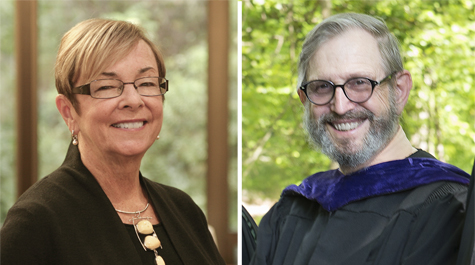Scholarships Created in Honor of Professors Barnard and Lee
Alumni Invited to Give Gifts to Celebrate Duo’s Contributions
In honor of Professors Jayne W. Barnard and John W. Lee, who retired this spring after distinguished careers, William & Mary Law School has announced the creation of two scholarships that alumni and friends can support. Both scholarships will provide funding to deserving students.
“So many of our former students wanted to do something to honor these two long-time faculty members,” said Davison M. Douglas, Dean of the Law School and Arthur B. Hanson Professor of Law. “And so, as the result of the generosity of our alumni, there will be student scholarships in the name of Jayne Barnard and John Lee. It’s a lovely tribute to two superb teachers and scholars that will live on.”
If you would like to support either or both of these scholarships and help William & Mary law students, please contact Sally Kellam, Associate Dean for Development and Alumni Affairs at (757) 221-2637, or sfkell@wm.edu.
Jayne W. Barnard
Barnard, the James Goold Cutler Professor of Law, joined the Law School faculty in 1985 after a successful career at the Chicago law firm of Jenner & Block, where she was elected to partnership in 1982, and then spent two years as Deputy Corporation Counsel of the City of Chicago. She holds a J.D. from the University of Chicago and a B.S. from the University of Illinois. She has written extensively about white-collar crime, securities regulation, corporate finance, and behavioral economics.
Barnard taught thousands of students over the course of her career in some of the Law School’s most foundational courses, including Business Associations and Securities Regulations. The Law School recognized her accomplishments when it named her the Herbert V. Kelly Sr. Professor of Teaching Excellence from 2010 to 2012.
As an academic and a scholar, Barnard is a nationally recognized expert in corporations, corporate governance, and securities regulation law. She was the first to propose that people harmed by economic crimes should be able to present victim-impact testimony (also known as victim allocution) at sentencing hearings. Her work was instrumental in Congress ultimately passing the Crime Victims Rights Act of 2004, which allowed victims of Bernie Madoff, for example, to offer victim impact statements prior to his sentencing.
Barnard was also the faculty advisor for two student law journals: the Journal of Women and the Law and the Business Law Review. In recent years, she led the Law School’s Women in Leadership Initiative, organizing three conferences for women leaders.
She was the recipient of the 2011 Thomas Jefferson Award, awarded to an individual who has demonstrated a deep devotion and outstanding service to the College, as well as the recipient of a 2010 Plumeri Award for Faculty Excellence. She also received the John Marshall Award for outstanding service to the Law School.
John W. Lee III
John W. Lee III, Professor of Law, joined the Law School faculty in 1981, after clerking for the Honorable C. Moxley Featherston on the U.S. Tax Court and a successful career as a partner with the firm of Hirschler, Fleischer, Weinberg, Cox & Allen in Richmond, Va. Lee earned his B.A. from the University of North Carolina at Chapel Hill, his LL.B. from the University of Virginia, and his LL.M. from Georgetown.
A specialist in tax law, Lee taught a wide range of foundational and specialized courses in the field, including Basic Federal Income Taxation, Small Business Tax, Real Estate Taxation, Small Business Planning, Non-Profit Corporations, Corporate Taxation, Advanced Corporate Taxation, Business Planning, and Tax Research Methods. In addition to teaching at the Law School, Lee was a Visiting Eminent Professor at the University of Alabama Law School from 2003 to 2004.
Known for his copious scholarship even while he was in practice before becoming a professor, Lee has written about a wide range of topics in the field of taxation, including capital gains, small business taxation, and ERISA. His work on the question of capitalization versus expensing provided the definition of investigatory costs and start-up costs in the legislative history to Section 195 of the federal tax code and helped to shape agency rulemaking on deduction and capitalization of expenditures.
His scholarship has been published in some of the leading tax journals in the country, including the Virginia Tax Review, the Tax Law Review, and Tax Notes, as well as the Virginia Law Review and the Texas Law Review. He was a participant and advisory board member of the Law School’s Annual Tax Conference for many years and a key member of the Law School’s former Master of Law and Taxation program.
About William & Mary Law School
Thomas Jefferson founded William & Mary Law School in 1779 to train leaders for the new nation. Now in its third century, America's oldest law school continues its historic mission of educating citizen lawyers who are prepared both to lead and to serve.
